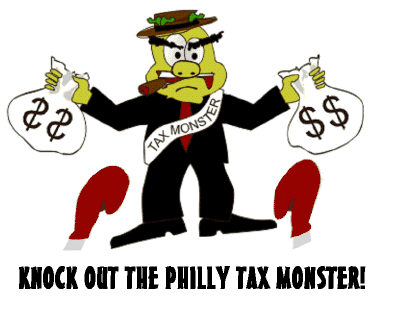- Home
- About
- News
- Tax Reform
- Ethics Reform
- Budget Reform
- Reformer’s Roundtable
- Contact Us







Progress On Tax Reform: Winsome, Not Lose Sums!
 We have progress to report in the push for tax reform! After enduring the final years of the Street mayoralty when progress on tax reform meant counting down the days until the 2007 election, we are happy to report that we are once again winning reforms to make Philadelphia’s tax structure more fair and less burdensome to help the city attract and retain jobs and neighbors. That tax-reform progress is definitely winsome, and since Philadelphia’s tax-rate reductions continue to lead to tax-revenue INCREASES, we need not be concerned that we will lose sums.
We have progress to report in the push for tax reform! After enduring the final years of the Street mayoralty when progress on tax reform meant counting down the days until the 2007 election, we are happy to report that we are once again winning reforms to make Philadelphia’s tax structure more fair and less burdensome to help the city attract and retain jobs and neighbors. That tax-reform progress is definitely winsome, and since Philadelphia’s tax-rate reductions continue to lead to tax-revenue INCREASES, we need not be concerned that we will lose sums.
Despite calls from some to halt tax-reform efforts due to the economic slowdown, the Mayor and City Council have preliminarily agreed on a plan to make historic changes to Philadelphia’s destructive tax structure.
The city is now poised to end the job-killing Business Privilege Tax as we know it — completely phasing out the portion of the tax that falls on gross receipts by 2017 and making first-ever cuts to the portion of the tax on net income, taking the tax down in increments to 6% in 2017. We can now see the day when city businesses will no longer have to pay a tax on receipts even if they make no profits and when it will be much easier for fledgling and growing businesses to make it in Philadelphia. This is definitely a win and a move that gets us where we need to be slowly, but definitely surely.
The city is altering the schedule for Wage Tax cuts, scaling back the currently legislated city-enabled reductions. However, because we will begin to benefit from significant reductions made possible by the arrival of state gaming revenues, the Wage Tax will get its largest cut ever in July when the tax will fall below 4% for residents for the first time since 1976. Into the future, the altered schedule will reduce the Wage Tax to 3.6% for residents and 3.25% for non-residents in 2013. This represents one small step back for the Wage Tax based on what had been legislated, but the overall improved tax picture is a leap forward for the city.
Putting this year’s progress into context, it is amazing to see how far we have come, but important to realize the challenge that still exists to remove the barrier to growth created by Philadelphia’s destructive tax structure. The city's modest tax reductions have slowly and steadily improved the city's competitiveness and the gap between national job growth and city job growth has been almost cut in half since the city began its tax reductions. The prospects of continued, steady improvement for the tax structure is exciting, but until Philadelphia is truly competitive — and not simply less uncompetitive — we will continue to lag economically.
In less than five years, the broad brush strokes of the Tax Reform Commission’s vision for a tax structure that is more fair and less burdensome are definitely coming into focus. The Wage Tax rates are falling, the Business Privilege Tax is losing its job-killing punch, and the city’s system of Real Estate taxation is getting the kind of scrutiny that will result in positive change.
A powerful combination of action by elected officials inside government and advocacy by citizens and civic groups across the city has truly made a remarkable difference and moved Philadelphia in a positive direction.
Today, taxes hold Philadelphia back. Now, tax reform will move Philadelphia forward.
